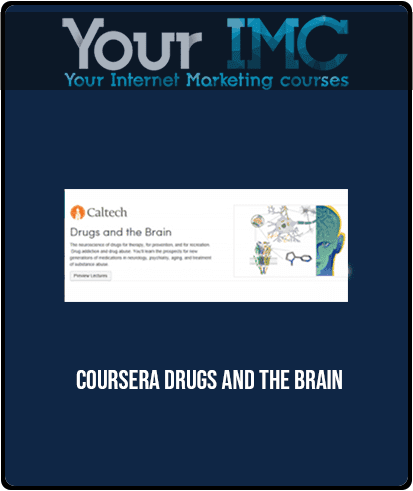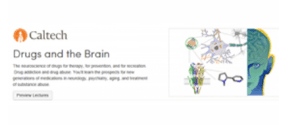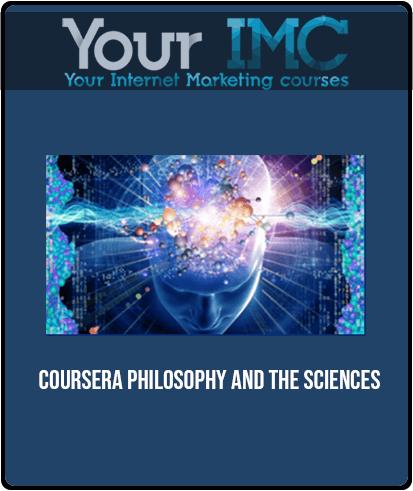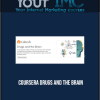Coursera – Drugs and the Brain
$229.00 Original price was: $229.00.$21.00Current price is: $21.00.
Coursera – Drugs and the Brain
PRODUCT DELIVERY: You will receive a download link via your order email.
Coursera – Drugs and the Brain
The neuroscience of drugs for therapy, for prevention, and for recreation. Drug addiction and drug abuse. You learn the prospects for new generations of medications in neurology, psychiatry, aging, and treatment of substance abuse.
About the Course
What happens in the body when a person smokes a cigarette? After several weeks of smoking? When a person takes antidepressant or antipsychotic medication? A drug for pain, migraine, or epilepsy? A recreational drug? Neuroscientists are beginning to understand these processes. You’ll learn how drugs enter the brain, how they act on receptors and ion channels, and how “molecular relay races” lead to changes in nerve cells and neural circuits that far outlast the drugs themselves. “Drugs and the Brain” also describes how scientists are gathering the knowledge required for the next steps in preventing or alleviating Parkinson’s, Alzheimer’s, schizophrenia, and drug abuse.
Course Syllabus
Week 1. Beginning 4 January 2014
Introduction and summary of the course. What is a drug? Types of drug molecules. Drug entry into nervous system. Drug receptors. Introduction to mammalian brains. Botulinum toxin. Origin of the resting potential. Electrophysiology.
Week 2. Beginning 11 January
Drugs activate ion channels. Drugs block ion channels. Drugs activate and block G protein pathways.
Week 3. Beginning 18 January
Drugs block neurotransmitter transporters. Pharmacokinetics. Recreational drugs
Week 4. Beginning 25 January
Drug addiction and Drug abuse.Nicotine Addiction.Opiate Addiction.
Week 5. Beginning 1 February
Drugs for neurodegenerative diseases: Alzheimer’s disease, Parkinson’s disease.
Week 6. Beginning 8 February
Drugs for epilepsy and migraine. Drugs for anxiety.
Week 7.Beginning 15 February
Drugs for psychiatric diseases: Depression, Bipolar Disorder, Schizophrenia. Prospects for better drugs.
Recommended Background
Neuroscience, the most interdisciplinary science of the 21st century, receives inputs from many other fields of science, medicine, clinical practice, and technology. Previous exposure to one or more of the subjects listed in “Suggested Readings” will provide a good vantage point, as we introduce material from these subjects.
Content:
Week_1._Organization_and_Overview_2_miniLectures
Week_1._Introductory_concepts_9_miniLectures
Week_2._Dose-response_Relations_3_miniLectures
Week_2._Synapses_5_miniLectures
Week_2._Channel_Blockers_2_miniLectures
Week_3._G_protein_pathways_5_miniLectures
Week_3._Neurotransmitter_transporters_2_miniLectures
Week_3._Recreational_Drugs_3_miniLectures
Week_4._Nicotine_Addiction_5_miniLectures
Week_4._Opiate_Addiction_4_miniLectures
Week_5._Alzheimers_Disease_3_miniLectures
Week_5._Parkinsons_Disease_5_miniLectures
Week_6._Pharmacokinetics_and_Metabolism_5_miniLectures
Week_6._Classifying_Psychiatric_Diseases_1_miniLecture
Week_6._Anxiety_Disorders_4_miniLectures
Week_7._Drugs_for_Major_Depressive_Disorder_4_miniLectures
Week_7._Drugs_for_Bipolar_Disorder_3_miniLecture
Week_7._Drugs_for_Schizophrenia_4_miniLectures
Week_7._Wrap-Up_1_miniLecture
Delivery Method
– After your purchase, you’ll see a View your orders link which goes to the Downloads page. Here, you can download all the files associated with your order.
– Downloads are available once your payment is confirmed, we’ll also send you a download notification email separate from any transaction notification emails you receive from IMC.sale.
– Since it is a digital copy, our suggestion is to download and save it to your hard drive. In case the link is broken for any reason, please contact us and we will resend the new download link.
– If you cannot find the download link, please don’t worry about that. We will update and notify you as soon as possible at 8:00 AM – 8:00 PM (UTC+8).
Thank You For Shopping With Us!
Be the first to review “Coursera – Drugs and the Brain” Cancel reply
Related Products
Hypnosis & NLP
Internet Marketing
Coursera – Financial Markets – Feb-April 2014 – Yale University


![[Download Now] IQJump IQ enhancer and increaser](https://imc.sale/wp-content/uploads/2022/02/IQJump-IQ-enhancer-and-increaser-imc-1-100x100.png)





9 reviews for Coursera – Drugs and the Brain
There are no reviews yet.